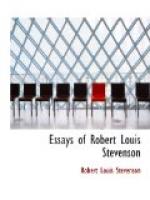[Note 14: Goethe’s Life, by Lewes. The standard Life of Goethe (in English) is still that by George Henry Lewes (1817-1878), the husband of George Eliot. His Life of Goethe appeared in 1855; he later made a simpler, abridged edition, called The Story of Goethe’s Life. Goethe, the greatest literary genius since Shakspere, and now generally ranked among the four supreme writers of the world, Homer, Dante, Shakspere, Goethe, was born in 1749, and died in 1832. Stevenson, like most British critics, is rather severe on Goethe’s character. The student should read Eckermann’s Conversations with Goethe, a book full of wisdom and perennial delight. For Werther, see Note 18 of Chapter VI above. The friendship between Goethe and Schiller (1759-1805), “his honest and serviceable friendship,” as Stevenson puts it, is among the most beautiful things to contemplate in literary history. Before the theatre in Weimar, Germany, where the two men lived, stands a remarkable statue of the pair: and their coffins lie side by side in a crypt in the same town.]
[Note 15: Martial. Poet, wit and epigrammatist, born in Spain 43 A. D., died 104. He lived in Rome from 66 to 100, enjoying a high reputation as a writer.]
[Note 16: Meditations of Marcus Aurelius. Marcus Aurelius Antoninus, often called “the noblest of Pagans” was born 121 A. D., and died 180. His Meditations have been translated into the chief modern languages, and though their author was hostile to Christianity, the ethics of the book are much the same as those of the New Testament.]
[Note 17: Wordsworth ... Mill. William Wordsworth (1770-1850), poet-laureate (1843-1850), is by many regarded as the third poet in English literature, after Shakspere and Milton, whose places are unassailable. Other candidates for the third place are Chaucer and Spenser. “The silence that is in the lonely hills” is loosely quoted from Wordsworth’s Song at the Feast of Brougham Castle, Upon the Restoration of Lord Clifford, published in 1807. The passage reads:
“The silence that is in the starry
sky,
The sleep that is among the lonely hills.”
... In the Autobiography (1873) of John Stuart Mill (1806-1873), there is a remarkable passage where he testifies to the influence exerted upon him by Wordsworth.]
[Note 18: A Nathan for the modern David. The famous accusation of the prophet to the king, “Thou art the man.” See II Sam. 12.]
[Note 19: The Egoist. See Note 47 of Chapter IV above. Stevenson never tired of singing the praises of this novel.]




